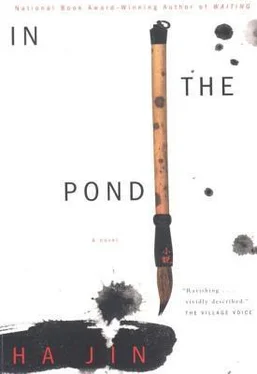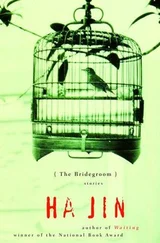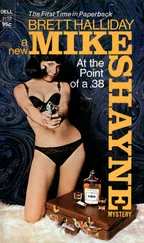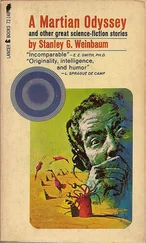Ha Jin - In the Pond
Здесь есть возможность читать онлайн «Ha Jin - In the Pond» весь текст электронной книги совершенно бесплатно (целиком полную версию без сокращений). В некоторых случаях можно слушать аудио, скачать через торрент в формате fb2 и присутствует краткое содержание. Год выпуска: 2014, ISBN: 2014, Издательство: Knopf Doubleday Publishing Group, Жанр: Современная проза, на английском языке. Описание произведения, (предисловие) а так же отзывы посетителей доступны на портале библиотеки ЛибКат.
- Название:In the Pond
- Автор:
- Издательство:Knopf Doubleday Publishing Group
- Жанр:
- Год:2014
- ISBN:978-0-8041-5372-0
- Рейтинг книги:4 / 5. Голосов: 1
-
Избранное:Добавить в избранное
- Отзывы:
-
Ваша оценка:
- 80
- 1
- 2
- 3
- 4
- 5
In the Pond: краткое содержание, описание и аннотация
Предлагаем к чтению аннотацию, описание, краткое содержание или предисловие (зависит от того, что написал сам автор книги «In the Pond»). Если вы не нашли необходимую информацию о книге — напишите в комментариях, мы постараемся отыскать её.
Under the Red Flag, Ocean of Winds
Waiting
In the Pond — читать онлайн бесплатно полную книгу (весь текст) целиком
Ниже представлен текст книги, разбитый по страницам. Система сохранения места последней прочитанной страницы, позволяет с удобством читать онлайн бесплатно книгу «In the Pond», без необходимости каждый раз заново искать на чём Вы остановились. Поставьте закладку, и сможете в любой момент перейти на страницу, на которой закончили чтение.
Интервал:
Закладка:
“All right, when you reach that position, don’t forget me,” Yen said, and slapped his own chest with both hands.
They laughed heartily.
Bin knew it would take him a few hours to complete the carving, but this was the only practicable thing to do. He chose a green jade stone, picked up Yen’s tool kit, and went to the inner room, where he would be alone, to concentrate on the work.
After biting his fingertips for a few moments, he decided to engrave Tu Fu’s line “Your brush writes, raising wind and rain.” It seemed no words were more appropriate as a compliment to Jiang’s uncle, a senior editor in a publishing house. Bin wrote out the words in the style of the ancient official script on the face of the seal and then began carving. He felt Yen’s knife was not as keen as his own, but it would have to do. Soon his hands were sweaty.
Meanwhile, in the other room Jiang was writing a letter for Bin to carry to his aunt. Song had left for his uncle’s to get the sick-leave certificate. In the kitchen Yen was cutting snap beans and pork with which to cook noodles for a midnight snack. Everyone was delightedly busy. The only other time they remembered being as brisk and purposeful was the beginning of the Cultural Revolution, when everybody had fought with a brush at night, writing posters and slogans.
Thirteen
THE TRAIN BOUND FOR BEIJING pulled out at four-ten in the morning. Bin waved good-bye to Yen and Song, who had accompanied him all the way to the station. To avoid being noticed by others, Yen and Song were standing among a score of people beyond the white railings. As the train moved out, Bin’s eyes were wet and his nose congested; he was touched by the commitment of these brothers, who had slept only two hours, preparing him for the trip.
Unlike a slow train, which would be so full that even its aisles and vestibules would be occupied by people, piglets, chickens, baskets, and parcels, this was an express train, from Dandong City to Beijing; it didn’t stop at small towns and had no unseated passengers. Without difficulty Bin found a window seat. Opposite him sat a young couple, dozing away. The woman’s face was resting on the table, her head cloaked in a red jacket, while the man leaned against her, a blue cap covering his face.
Bin looked out the window. Strips of mist were flitting by, and wire poles and mulberry trees were falling away. Green paddies, glimmering and undulating in the breeze, surrounded a village; some chimneys were exhaling smoke; a pair of magpies were flapping on a treetop. Beyond rows of dwarf houses stood a barren, steep hill on which a few gigantic words were built in white rocks: “Grasp Revolution, Promote Production.”
Bin closed his eyes and tried to get some sleep, since there would be a busy evening in Beijing and he should appear in high spirits when meeting Jiang’s relatives. The music of a Mongolian song was slow and soothing. Soon he dozed off.
Although the place where Jiang’s aunt lived wasn’t hard to find, it took Bin almost two hours to get there after he alighted from the train, because buses in the capital moved slower than bicycles. Following Jiang’s directions, Bin took the No. 103 bus and got off at its terminus — Beijing Zoo. Then he walked west, toward the last glow of the setting sun. After two blocks, he turned south and went along a short boulevard, full of neon lights and Hong Kong music. Having walked along the sidewalk for about five minutes, he saw a group of residential buildings enclosed by a brick wall. According to the map Jiang had drawn, this was the place.
At the entrance to the compound, he was stopped by an old guard, who was bony and entirely bald, and had fat ears. The man read Bin’s official letter and told him that Li Peina, Jiang’s aunt, lived at 423 in Building 6.
Bin was surprised to see that Peina wasn’t an old woman. She was pleasant looking, plump, and in her late forties, just a few years older than her nephew Jiang Ping.
“Come in, Comrade Young Shao,” she said tepidly, rubbing her floury hands on her apron. Seeing that he was somewhat amazed by her greeting, she smiled with her round eyes narrowed and said, “I received a telegram from my nephew this afternoon.”
Bin followed her in. The skin of her brownish arms reminded him of the bread in a bakery window he had seen a few minutes ago. Her permed hair was slightly gray and covered half her neck. She led him into a large room, where a middle-aged man in black-rimmed glasses was sitting at a desk and reading the Beijing Evening News.
“This is my husband,” Peina said to Bin.
Sitting in the chair and still keeping his eyes on the newspaper, the man silently stretched up his hand. Bin shook it, feeling it was as soft as a young girl’s.
“Have a seat,” Peina said, and pointed to a chair by the desk. Bin sat down and looked around. He was amazed to see hundreds of books in Russian on the shelves along the walls.
The man in glasses was still reading.
“He works at the Foreign Literature Publishing House,” Peina explained. Bin nodded and noticed the man had shiny, dark hair, in contrast to his face, which was creased like a shriveled gingerroot.
Finally the man put down the newspaper and said in a bass voice, “I’m Chai Hsin. You can call me Old Chai.” Seeing Bin’s eyes moving along the books, he went on to explain, “I’m a translator of Russian literature, mainly poetry.”
Bin was impressed and asked, “Do you translate Pushkin?”
“No. I used to, but now I work on modern Russian poets, particularly Yesenin, whose style I try to learn.”
“So you’re a poet?” Bin blurted out. He knew Yesenin was a lyric poet, though his knowledge of his poetry was limited to the three poems in the anthology One Hundred Modern Russian Lyrics.
Mr. Chai smiled, displaying his tobacco-stained teeth, and said, “Sometimes I write poetry. So you know Yesenin’s work?”
“Yes” — Bin nodded — “I like his lyrical style, very touching, so beautiful.” Then, with a thumping heart, he recited aloud the lines that had moved him to tears when he had read them three years before:
Oh, the language of my countrymen
Is alien to me all at once.
I am a foreigner in my own town.
Mr. Chai lowered his head, listening, as though bewildered by the Chinese words; then a smile like a crumpled chrysanthemum spread on his face. “I’m damned, that’s from ‘Soviet Russia’!” He kept shaking his head.
“Yes.” Bin felt relieved, because he had forgotten the title of the poem; Mr. Chai had helped him out just in time.
Peina meanwhile poured boiling water into a teapot, muttering, “My nephew never stops making trouble. He’ll never grow up.”
“Good, young man, I’m very glad to meet you,” Mr. Chai said. Indeed he hadn’t expected that anyone younger than himself would know the great Russian poet by heart, but this young fellow from the countryside, though he looked like an oaf, could quote Yesenin off the top of his head. Mr. Chai was genuinely moved. He stretched out his hand, and they shook hands again.
Bin was afraid his host would talk more about Yesenin, so he fished the seal out of his army satchel. Carefully he opened the red paper and placed the green stone on the desk. He said to both Mr. Chai and his wife, “I came directly from your nephew’s home and couldn’t bring anything really artistic, so I carved this for you last night. I hope you like it. I’m so embarrassed to present you with such a trifle.”
Mr. Chai picked up the seal, removed his glasses, and observed the engraving. Below his lower eyelids two purplish bags were quivering. Bin felt that Mr. Chai must have been knowledgeable about epigraphy, because he seemed to be examining the texture, suppleness, and vigor of the strokes.
Читать дальшеИнтервал:
Закладка:
Похожие книги на «In the Pond»
Представляем Вашему вниманию похожие книги на «In the Pond» списком для выбора. Мы отобрали схожую по названию и смыслу литературу в надежде предоставить читателям больше вариантов отыскать новые, интересные, ещё непрочитанные произведения.
Обсуждение, отзывы о книге «In the Pond» и просто собственные мнения читателей. Оставьте ваши комментарии, напишите, что Вы думаете о произведении, его смысле или главных героях. Укажите что конкретно понравилось, а что нет, и почему Вы так считаете.






![О Генри - Пимиентские блинчики [The Pimienta Pancakes]](/books/407355/o-genri-pimientskie-blinchiki-the-pimienta-pancake-thumb.webp)





